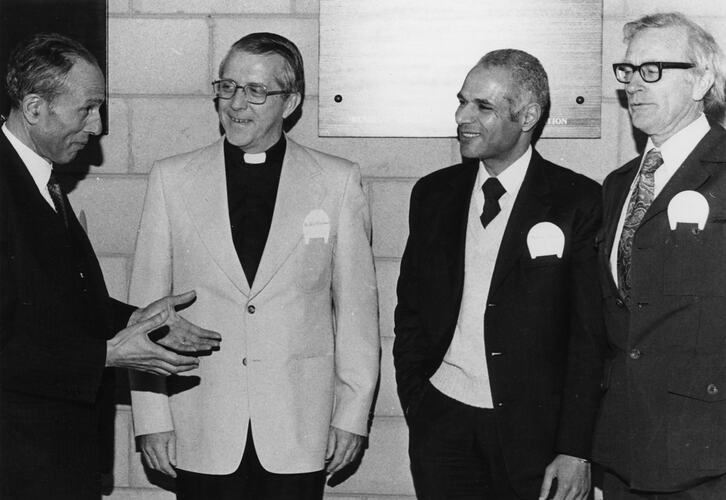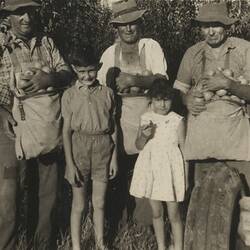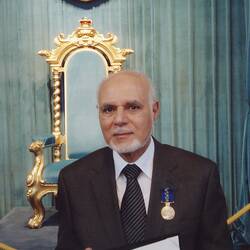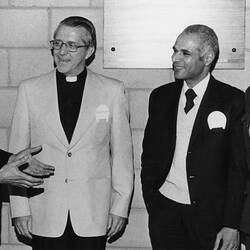Summary
Mohamed Hassan left Egypt with his family for England in 1964 where he studied for a Masters of Textiles Engineering at Leeds University. In 1967, he and his family migrated from England to Sydney.
Mohamed Hassan, an Egyptian Muslim, left Egypt for England with his young family in 1964. He was studying for a Masters of Textiles Engineering at Leeds University after his graduation in Electrical Engineering at Alexandria University, Egypt. In 1967 they migrated from England to Sydney. They were the only Muslims living in a British hostel for four months on arrival, as they had arrived on a British travel document.
In Sydney they first met Muslims in 1967 at the University of NSW, but 'only after six months, they met them by the chance on campus in the canteen'. In 1967 Mohamed met Muslims in Surrey Hills, Sydney, and attended the first Eid celebration in a Surrey Hills' terrace house within the Islamic Society of NSW. He quickly took an active part in community activities. He joined the Muslim Students' Society of New South Wales University and then became second President of the Islamic Council of NSW based at Surrey Hills. From New South Wales Mohamed and family then settled in Bendigo in central Victoria.
Mohamed recalled: 'We lived in Bendigo from 1970 to 1982 and it was difficult to find other Muslim families there. There was no jumuah (Friday prayer) congregation in the country town - we had to travel to Shepparton or Melbourne on holidays and Eid. It was the lack of halal food and wudu at work - no Islamic burial was allowed - just coffin, no cloth shroud allowed'. Practising the Islamic faith where a mosque didn't exist, and under pressure to assimilate, was hard, especially in rural settings.
The Hassan family then moved to Melbourne where muslims were meeting in 1970 at the Islamic Society of Victoria in the Preston house (masjid). The Muslim community in Preston was still small but diversifying. During Friday prayers two-three prayer rows were formed including Pakistani, Lebanese, Egyptian and Fijian people among others. Mohamed joined the multi-ethnic Muslim community in Victoria during Eid celebrations and prayers in the Preston house, supported the establishment of Sunday school at the Mosque.
Mohamed was among the key Muslim participants in interfaith relations in Victoria. In 1976 the first Muslim-Christian Interfaith Conference was organised in Bendigo by Mr Hassan Mohamed. The conference included the Islamic Council of Victoria and Anglican and Catholic ministers as well as international speakers. The AFIC president, Professor Mohamed El Erian, also attended this conference. Mohamed's son, Dr Ahmed, who grew up in Bendigo, remembers when his father organised the city's first interfaith dialogue: 'He realised people didn't really know much about other faiths'. But, it was an important move forward in interfaith understanding and interfaith support that Muslims also benefited.
Mohamed reflects: 'In the 1980s we (Egyptian community leaders) approached the Anglican Church to purchase the church in Lloyd St Heidelberg for the Elsedeaq Egyptian Islamic Society. The priest rejected the approach. Shortly I contacted an Anglican priest I know from interfaith conversations and we arranged a meeting with him, the Heidelberg Priest and a few members from our society. They met three-five of us, mostly teachers and engineers. They realised we were just normal families and had much in common, then agreed to the sale to keep the place a house of worship.' (bendigoadvertiser.com.au/story/2412071/fighting-the-stereotype/).
Mohamed was particularly interested in the education of Muslim youth. He learned the history and the fate of Afghan cameleers and was moved by they contributed to Australia by working hard in exploration and transport. This motivated him to take on the portfolio of Youth and Education as AFIC Vice-President in 1970s. (G. and C., Turnbull, 2014, 'Standing Tall: The Story of Minaret College', Print Logistics, Victoria) Mohamed was a founder and director of the successful Minaret College during his 25 years of untiring service. (Minaret College Newsletter, 20 February, 2017. minaret.vic.edu.au).
Hassan always maintained the importance of the role of education and in one of the conference speeches in 1978 he stated that the teaching of English is essential for migrants, children and adults. (Paper at the 4th Annual Cultural Conference Goulburn College of Advanced Education) Haji Mohamed Hassan's message for the Muslim youth is that Islamic education is 'very critical to enable Muslims to understand and practise their religion', while the interfaith education of Muslims is also 'vital to interact and understand those of other faiths'.
In 2007 Mohamed Hassan was awarded The Medal of the Order of Australia for Lifetime Achievement.
Based on Dzavid Haveric's email correspondence with Dr Ahmed Hassan & Mr Mohamed Hassan, 2017.
More Information
-
Keywords
-
Authors
-
Article types



